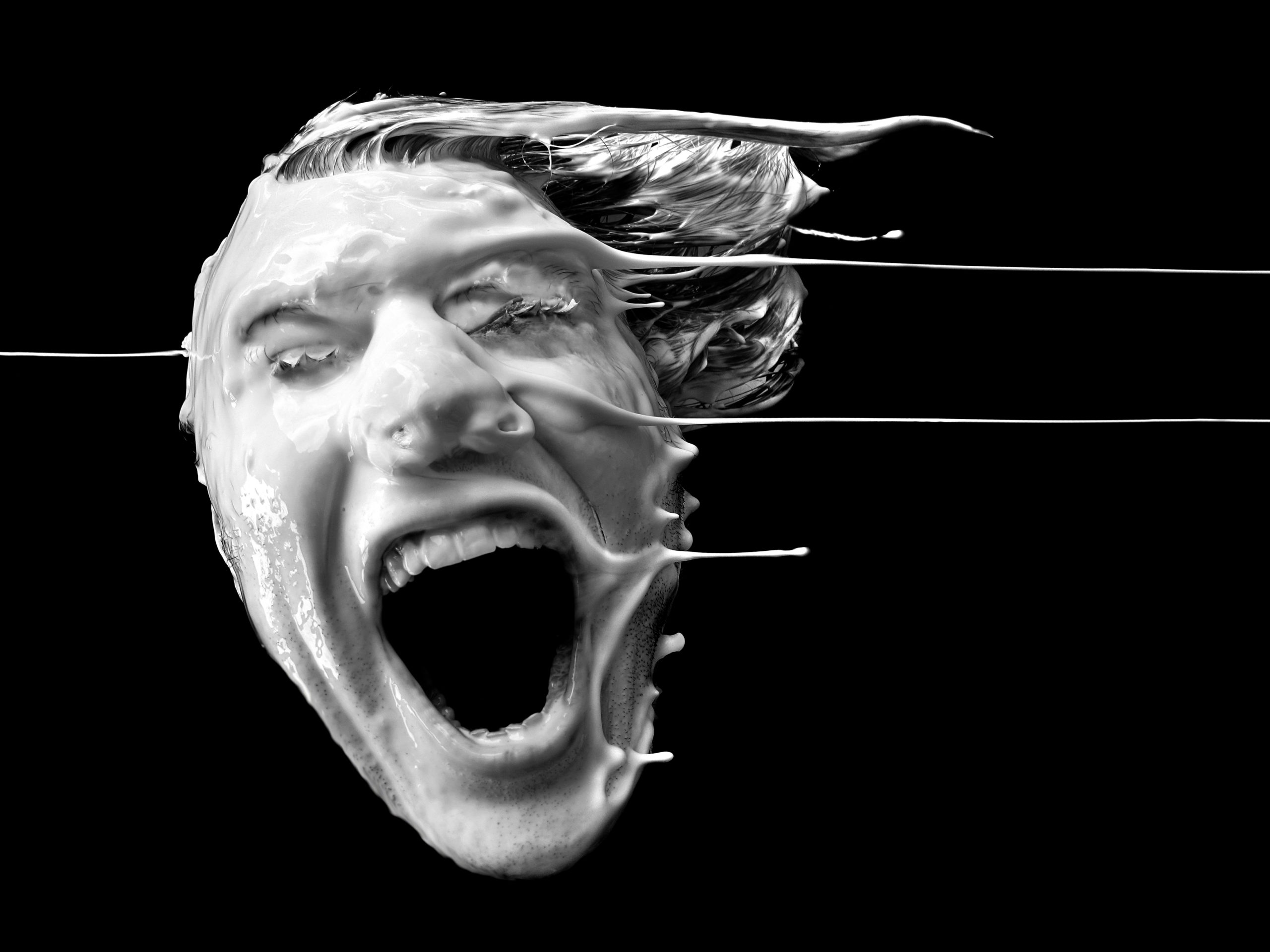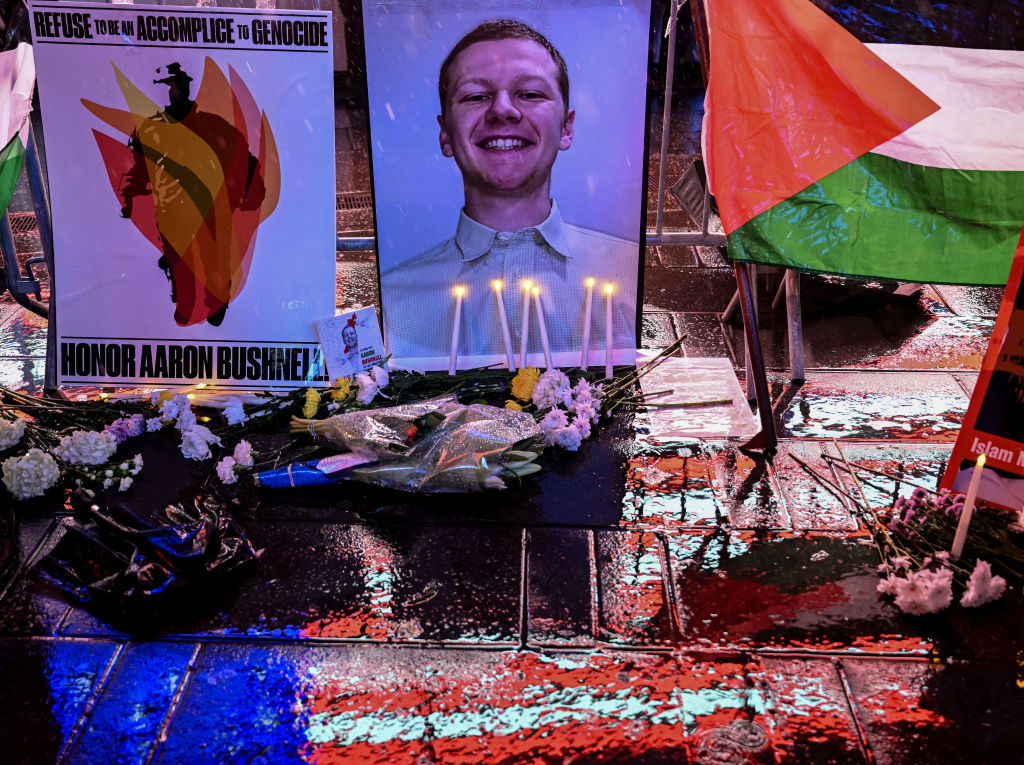You’ll never be radical enough.
Please Accept My Unworthy Sacrifice

The origin of the white liberal bad conscience.
On February 25, 2024, at approximately 12:58 PM local time, Aaron Bushnell, a 25-year-old member of the United States Air Force, walked up to the gates of the Israeli embassy in Washington DC, doused himself with a flammable liquid and set himself on fire. The whole event, including the desperate attempts of Secret Service agents to extinguish him, was livestreamed on Twitch.
In the moments before he set himself on fire, Bushnell told the audience that he was protesting “what people have been experiencing in Palestine at the hands of their colonizers.” Bushnell declared that he would “no longer be complicit in genocide.” As he burned, he shouted, “Free Palestine!” several times, then collapsed to the ground. He was rushed to hospital and pronounced dead at 8:06 PM.
Bushnell’s self-immolation was, apparently, well planned. He wrote a will which left his savings to the Palestine Children’s Relief Fund and assigned care of his cat to his neighbor.
On the day of his self-immolation, he posted on Facebook, “Many of us like to ask ourselves, ‘What would I do if I was alive during slavery? Or the Jim Crow South? Or apartheid? What would I do if my country was committing genocide?’ The answer is, you’re doing it. Right now.” He sent a message to media outlets stating, simply: “Today, I am planning to engage in an extreme act of protest against the genocide of the Palestinian people.”
Bushell’s self-immolation was not the first in protest against the ongoing crisis in Gaza. Back in December, a female protestor set herself on fire outside the Israeli consulate in Atlanta. She was also seriously injured, but survived. This piece isn’t about the ethics of self-immolation, or not exactly, nor is it an examination of the rights and wrongs of Israel’s response to the events of October 7, 2023. Rather, I want to talk about Aaron Bushnell as a Nietzschean figure, dramatizing in his tortured thinking and his painful, sad demise a new variation of a story told in one of Nietzsche’s most famous works, The Genealogy of Morals.
This is, fundamentally, a story about the emergence of a certain kind of self-consciousness—a “bad conscience” to borrow Nietzsche’s phrase—a feeling of guilt that is impossible to assuage and that brings a sublime cruelty to bear on the sufferer. I call this the “white liberal bad conscience,” because in 2024 it uniquely afflicts white liberals, like Aaron Bushnell (although he actually called himself an anarchist, on the internet). At base, it is a religious conviction, taking a religious form and requiring a religious level of conviction—a religious taste for self-mortification and self-sacrifice—to discharge to its fullest extent. Bushnell had that conviction, which is why he’s now dead.
Although Nietzsche would not be surprised at the twisted social and individual psychological effects of this bad conscience, he would be surprised by its object, which is not an all-powerful, omnipresent judging God, but a particular group of people who have been elevated to an absurd stature in modern Western society—so-called “Persons of Color.” And whereas Nietzsche saw the development of the bad conscience as taking millennia of historical time, it appears to have taken Bushnell a mere four years to develop his, the total length of his career in the Air Force.
Nietzsche was in no doubt that the origin of the moral sense in humanity was our innate taste for cruelty, to trap and torture others, only turned inwards, against ourselves. The case of Aaron Bushnell could not be a clearer example of this unsettling truth. A young white man burns himself to death in public, because he felt it was the only appropriate response to his Original Sin as a white person. But what makes it even worse is that the people he was trying to appease—“Persons of Color”—have rejected his offering of himself. Nothing he could ever do, or anybody like him could ever do, would be good enough. In his will, Bushnell explains that “I do not wish for my ashes to be scattered or my remains to be buried as my body does not belong anywhere in this world,” though if the Palestinians someday become free, and are “open to the possibility,” he would “love for [his] ashes to be scattered in a free Palestine.” Bushnell’s life as a white man was so ridiculous and obscene that it was a privilege to be allowed to commit suicide in the name of someone else’s cause.
We are all witnesses to a profound theatre of cruelty, staged along gross racial lines, which threatens to unleash horror on the widest possible scale across the Western world if it is not challenged.
In the second essay of The Genealogy of Morals, Friedrich Nietzsche offers an historical account of the origin of individual moral responsibility, as a thing and a form of self-consciousness. Moral responsibility, as calculation, is necessary for the emergence of an important figure in Nietzsche’s thinking, the “sovereign individual”—“an animal which can make promises.” Central to this historical process is the development of an internal mechanism to regulate the sense of responsibility: a conscience. And a conscience is, most of all, a form of remembering. Nietzsche both praises and dispraises conscience, depending on its aim. There is good conscience and there is bad conscience.
Once upon a time, in Nietzsche’s historical scheme, man had no sense of personal responsibility at all. Man is forgetful by nature, Nietzsche tells us, for the sake of his own health. Forgetfulness is a “positive faculty of repression,” keeping man’s existence light and airy. In a state of nature, man—including the “blonde beasts” Nietzsche’s less sophisticated interpreters tell us he admired so much— operated beyond any sense of good and evil. He simply acted, and even considered himself possessed by different gods when he was angry, lustful, or expressed any other strong emotion.
Nietzsche sees the origin of moral responsibility in the very earliest forms of commercial relations, between buyer and seller, whether via money or simple barter. This is exemplified, he says, in the shared etymology of the words “ought” and “owe.” As a result of exchange, man starts to become calculable himself, just like a transaction. There is a cost to behavior that can be weighed and judged. In the earliest societies, when a man failed to pay a debt, it was simply the cruelty of the man to whom the debt was owed that would demand some other form of payment in kind—perhaps even, quite literally, the Shakespearian pound of flesh.
Over a longer period of time, perhaps millennia, the relationship between cruelty and conscience would become far more complicated. Bad conscience begins to creep in as man becomes part of a “politically enclosed society,” with the emergence of the state, usually in the wake of violent conquest by aristocratic groups like the “blonde beasts” mentioned above. Subject peoples are forced by the physical act of conquest, but also by psychological processes, into becoming more and more governable, which means a greater sense of personal responsibility. Man’s drives, including his drive for cruelty, are forced to turn inward and begin reshaping him from the inside out.
Religion is crucial, Nietzsche says, for bad conscience to become bound up with feelings of guilt and a sense of the highest possible punishment. At first, a tribe or small grouping is in a relation of credit towards their ancestors, who are always present, a fact you’ll know if you’ve read any anthropology of tribal societies or even an historical study like Montaillou. The ancestors’ past good deeds, and their continuing favor in the present and future, demand constant sacrifices and services from the living.
Over time, as the power of a tribe grows, the debt to the ancestors becomes greater. The tribe owes ever more to the ancestors, who simultaneously recede from view, and become less and less like their living descendants. Eventually, the ancestors become gods, with hugely increased powers of favor, disfavor, and judgment.
The possibility of paying off the debt owed to the gods diminishes, until finally, with the arrival of Christianity, that debt becomes unpayable. According to Nietzsche, Christianity is the apotheosis of the bad conscience. Now, nothing man can do is sufficient to expunge the stain he carries from birth to death. This is the doctrine of Original Sin and, as we know, the only way for the debt to be repaid is for God to take human form on earth and allow himself to be crucified, as a final everlasting form of sacrifice, on man’s behalf.
Once man has been conditioned to believe, over a long period of time, that he has debts and that he must pay them, even by giving away parts of his own flesh if necessary, to convince him that he is unable to do so is a sublime act of cruelty indeed. Perhaps it is the greatest act of psychological cruelty in history. Humanity is tortured by the realization of its unworthiness, its inability to pay what it owes—what it ought. All of man’s drives, especially his cruelty and hatred, are unleashed upon himself.
And for Nietzsche, what crowns the irony of this transformation from primitive to divine cruelty is the idea that God redeems man out of love.
God personally immolating himself for the debt of man, God paying himself personally out of a pound of his own flesh, God as the one being who can deliver man from what man had been unable to deliver himself—the creditor playing scapegoat to his debtor, from love (can you believe it?), from love of his debtor!
Importantly, Nietzsche makes the prediction that the decline of Christianity is likely, slowly or maybe even quickly, to bring an end to “guilt consciousness” of this sort.
We cannot shut our eyes to the prospect of the complete and eventual triumph of atheism freeing mankind from all this feeling of obligation to their origin, their causa prima. Atheism and a kind of second innocence complement and supplement each other.
In fact, the opposite appears to be true. The decline of Christianity has not eradicated guilt and bad conscience. In the case of Aaron Bushnell, as we’ll see, the decline of his faith in the last four years appears only to have increased his feelings of his own unworthiness and helplessness in the face of a debt he had convinced himself he could not pay.
It’s hardly an original point that liberalism and leftism more broadly, as ideologies and structures of feeling, are outgrowths of Christianity and its ideals, including its emotional structure, but it’s true, perhaps much truer than we think. Which is why, whether you agree or not with Nietzsche’s account of the origin of the bad conscience, and with his assessment of Christianity as its pinnacle, it’s almost impossible to ignore the close parallels between what Nietzsche sats about bad conscience on the one hand and the beliefs and unspeakable self-cruelty of a young man like Aaron Bushnell on the other.
That Aaron Bushnell believed he was possessed of a particular kind of Original Sin is beyond doubt. He said as much. Nine months ago on Reddit, he wrote, in response to a query from another user about joining the armed forces, “the U.S. DoD is one of the most powerfully evil institutions to ever disgrace the face of this planet. You will have blood on your hands that you will never be able to wash off. There are many people who suffer under the imperial boot who would have every reason to wish you dead, and they would be justified. Don’t do it.”
Remember, Aaron Bushnell was employed by the U.S. Department of Defense at this point, and had been for over three years. “You will have blood on your hands that you will never be able to wash off.” “I already do”—were the words left unspoken.
His extensive posting history on Reddit can tell quite us a lot about the origin and development of his extreme sense of personal guilt. Just four years ago, as he was preparing to join the Air Force, Bushnell was an earnest Christian. In one post he called for the world’s various churches to abandon their dogged commitment to “secular, theological and historical differences” and embrace “our Lord’s commandment to love one another as ourselves.” He even poured scorn on a typical libtarded “umm, actually Jesus was a brown illiterate migrant” post in the r/radicalchristianity subreddit, calling people who make such claims “pharisees.”
And yet, within four years he went from posting well-meaning Christian content and light-hearted Air Force memes, via complaints about the Air Force’s healthcare system and requests for help finding videos on “non-binary gender identity” to believing had an unpayable debt towards the “colonized” peoples of the world, simply by virtue—or should I say, sin—of his being a white person.
He was no longer religious, either, as he noted in a post three months ago, where he discussed his various options for leaving the military. He couldn’t leave as a conscientious objector, he said, because “I’m not religious so I would have to fabricate a whole lot of evidence.” He had at least managed to get released from active military duties, he added. He also said he wouldn’t try to get himself kicked out, because it might ruin his future prospects.
That was just three months ago. It’s not clear what changed in the meantime; although Bushnell may have been keeping up appearances and disguising his true intentions at that point. We don’t know.
A familiar anti-white virulence, the poison of today’s hip racial-grievance mongers like Ibram X. Kendi, is on display throughout Bushnell’s more recent posts. “Whiteness needs to be abolished,” Bushnell wrote. America is a white-supremacist settler-colonial nation, and so on. There’s lots of talk of “imperialism,” and how his complicity in it made him, and even his own family, a lesser class of person. In one post he described at length how violence against his own family would be okay if it came from “people who are resisting my family’s occupation of their land.” Elsewhere he said, “My so-called ‘human rights’ can’t override those of the people I am colonizing,” and so if you are a “colonizer” you forfeit your human rights, including the right to “bodily safety.”
Less than a month ago, we can see Bushnell talking about Israel as a “white-supremacist” nation, founded by and stocked with white supremacists from Europe. Israel is a “settler colonialist apartheid state,” he said, and nobody in Israel is innocent. “There are no Israelis without the genocide of the Palestinian people.” He slams people for “clutching their pearls” about the October 7 attack on the music festival, which he reminds his fellow Redditors took place just three miles from Gaza. “Imagine a similar event happening in the early days of the colonization of North America. Can you or I really say that Indigenous [notice the capitalization] people are wrong for retaliating against colonizers who are rubbing their domination in their face?”
Some of the more deeply stupid segments of the right have cheered Bushnell for striking a blow against Israel, but the truth is, Bushnell didn’t set himself on fire because he hated Jewish people. Or if he did, he hated them because he thought they were white, because he saw them as part of a larger problem, which is white people. Which was himself. Aaron Bushnell was not some confused Hitlerian who only had to hop from one side of the political horseshoe to the other to assume his rightful place. He was motivated by a pathological hatred of his own people, so pathological he was willing to justify violence against his own family in its name—so pathological he was willing to die for it himself.
Even if it’s not clear from his posts exactly what tipped him over the edge or when, it’s clear that during the course of his four years in the Air Force, Aaron Bushnell came to see the world and his place in it as part of a series of strict binaries: oppressor/oppressed; colonizer/colonized; whites/people of color; undeserving of respect and dignity/deserving of respect and dignity; and so on.
Everything binary. Everything, that is, except his own gender. Could a belief that he was transgender be the key to unravelling this horrid saga? Quite possibly. In addition to his queries on Reddit about resources for non-binary people, it’s worth noting that Bushnell became a member of “Serve the People”, a “queer revolutionary organization” based in Akron, Ohio, that feeds the homeless and migrants, according to a representative of the organization on Twitter. Back on Reddit, under a video of Cenk Uyghur, Bushnell posted “TERFS FUCK OFF.” “TERFS,” for those who are still blessed with ignorance, are “trans-exclusionary radical feminists”—basically any feminist who refuses to believe men can be woman and should be treated as such. He even blasted someone, in another post, for being “fatphobic.”
All in all, this is not a good advertisement for a career in the US military. Give us a young man and give us four years, and we’ll give you… a transgender gay race communist who sets himself on fire in public out of an overwhelming hatred of himself, his nation, and his race. Not a good look at all.
And, of course, it also begs the question: How could a mentally unstable gay race communist end up in an important cryptological unit right in the heart of the military intelligence establishment? Bushnell was in the 531st Intelligence Squadron, assigned to 70th Intelligence, Surveillance and Recon Wing at Fort Meade, Maryland. People in the know tell me that’s the NSA. Anyway, the public is unlikely ever to find out.
What completes the story, what gives it a cruel twist that would have made even Nietzsche wince, is the response from the broad community in support of whom Bushnell claimed to be making his final act of protest: “the colonized,” “People of Color,” etc. On Twitter, many Muslims were quick to call him a “kaffir”—an unbeliever—and criticise him for committing suicide, which is punishable in Islam with an eternity spent burning in hell. This supposed irony, that Bushnell would spend the rest of all time being set on fire again and again and again, was not lost on Muslim observers. “He was still a Kaafir who disbelieved in Allah & his Messenger… he is definitely not resting in peace,” one said.
But surely the worst response came from a Twitter user with the handle @nicotinecultech, apparently an Asian man and not a Middle Eastern Muslim.
“No I don’t believe we can’t speak ill of the dead,” he wrote. “I think that’s a colonial ideology that prevents us from having conversations about the complex impacts a person’s life has made including the actions that make that cause legitimate harm, no matter if they repented at the end.”
He continues in another tweet: “Aaron Bushnell’s self immolation was an act of penance driven by want to absolve himself of white guilt as an active military man. He is not a martyr, and his choice was a privilege Palestinian martyrs forces to fight do not have and are not lauded for.”
It’s difficult to know what to say in response to that, really. Suicide. A privilege, but only for white people.
I suppose I’ll say this. In the end, by the twisted logic of this new Original Sin—the sin of “white guilt,” of being a colonizer and oppressor by birth—there really can be no expiation. Not even the death of the sinner, the ultimate sacrifice, can wash the sin away. Not even the death of God in man’s stead, because in this scheme God doesn’t even exist. What comfort Jesus’s sacrifice offered the tormented Christian—gone, forever. There is just torment. And with that torment, death, and with death, the sneers of those it was staged to appease, baying for even more innocent blood.
The American Mind presents a range of perspectives. Views are writers’ own and do not necessarily represent those of The Claremont Institute.
The American Mind is a publication of the Claremont Institute, a non-profit 501(c)(3) organization, dedicated to restoring the principles of the American Founding to their rightful, preeminent authority in our national life. Interested in supporting our work? Gifts to the Claremont Institute are tax-deductible.
First the Jews became whites; then the whites became Jews.
Aaron Bushnell embraced his unworthiness as a white man and expressed it in a futile gesture of sacrifice.



